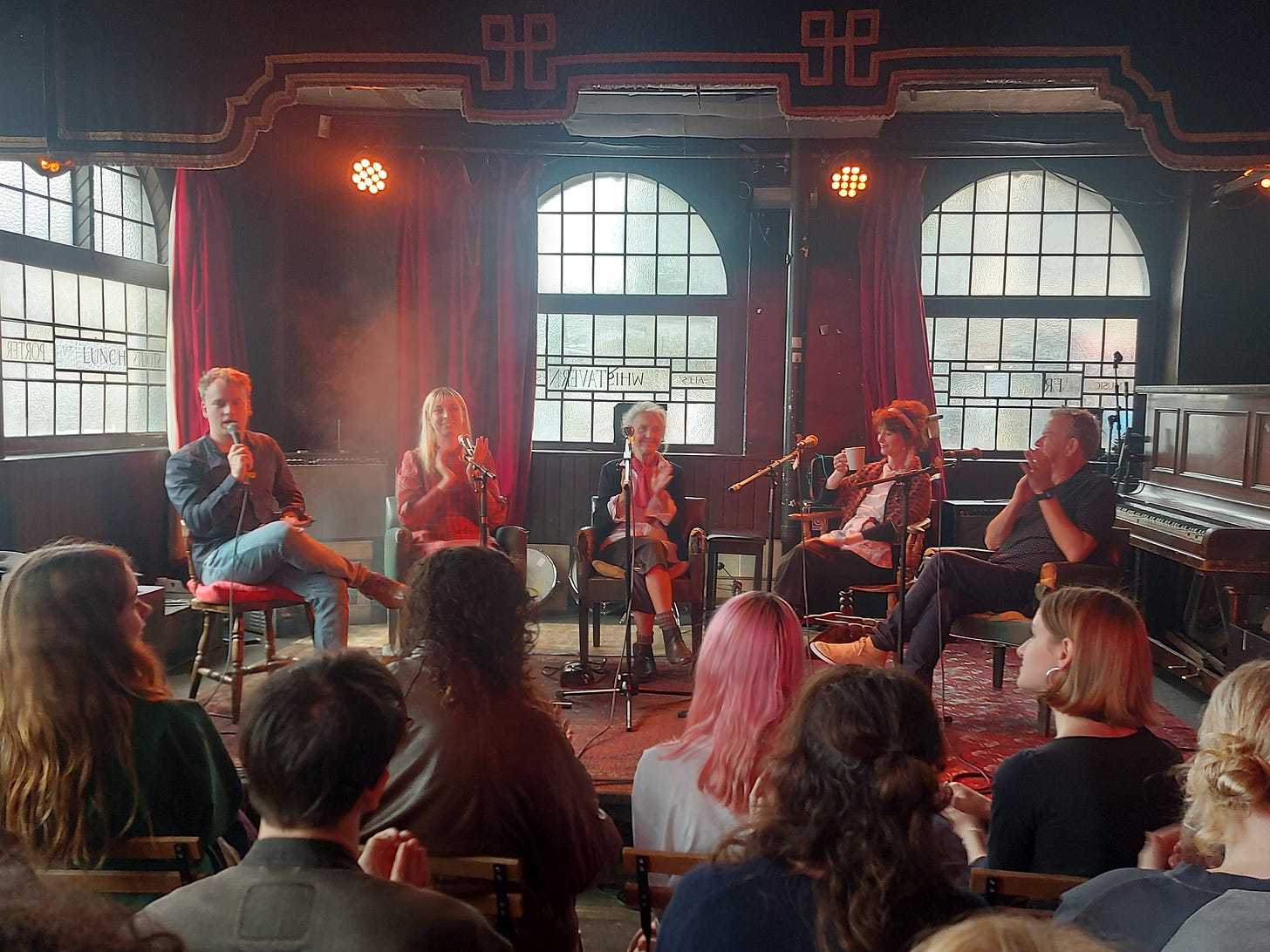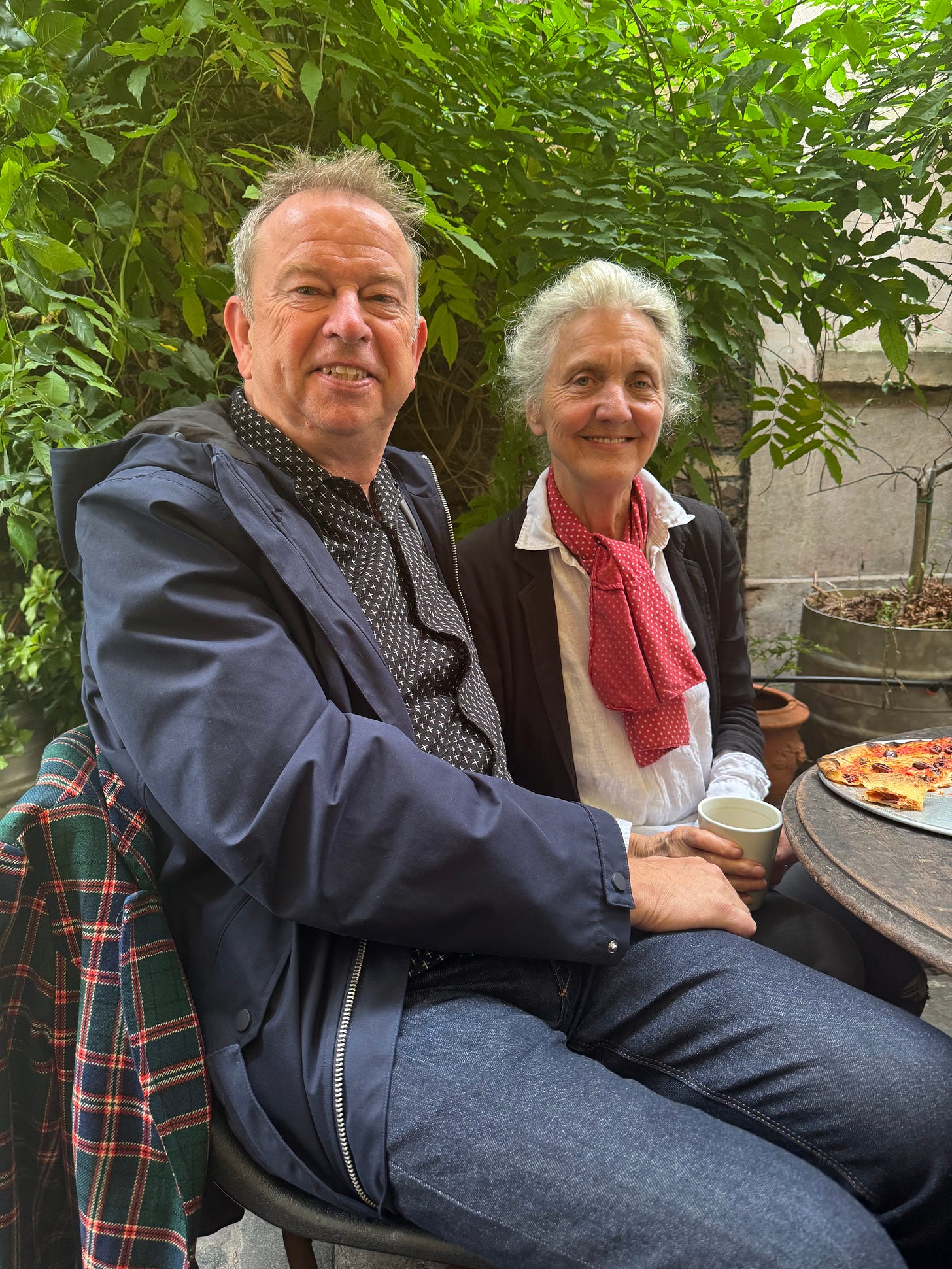Get Up, Stand Up
Twenty One Years of Pauline Forster’s Fight, Community & Music in Whitechapel
There is a Grassroots Music Venue on Commercial Road in Whitechapel where the wallpaper peels in places, the mirrors are fogged with history, and the ghosts of three centuries lean over your shoulder to ask if you will be having another. It is called The George Tavern, and if you have not been, then you have missed something that is not easily explained. It is one of those spaces that does not sit neatly in the brochures or the regeneration masterplans. It is awkward, brilliant, too loud, too alive. It has endured. And for the last twenty one years, it has endured because one woman, Pauline Forster, decided that it should.
The George is older than nearly everything around it. As a pub it has been serving Londoners in some form since at least the seventeenth century, when the East End was still half fields and half dockside. Its walls have seen sailors from the Thames, actors from the nearby playhouses, aristocrats escaping polite society, and generations of ordinary people gathering under the same roof because the great thing about music and beer is that they do not ask too many questions about your background. The George is listed as Grade II, which means officially somebody somewhere acknowledges that it has cultural value. But the reality is that most of its value has never been written down in planning documents. It is in the fact that it is still standing at all.
Whitechapel has never been still. Every few decades it throws off its skin and reappears in a new form. Dockers and rope makers gave way to Huguenot weavers, who gave way to Jewish tailors, who gave way to Bangladeshi restaurateurs. Each wave layered its own music, food, arguments and celebrations into the neighbourhood. What Whitechapel rarely does is make it easy for people to stay. It is a place where property developers sniff around like foxes at the bins, where rising rents and new neighbours with delicate ears are constant threats, and where the word regeneration is so often followed by the word closure.
That was the environment into which Pauline Forster walked in 2003 when she bought The George. She was an artist by trade, not a publican. The purchase was not a business plan. It was, in the truest sense, an act of faith. Faith that a space that had stood for centuries could still matter in the twenty first, if somebody loved it enough. She later remembered that when she first viewed it there were twenty others waiting behind her but, as she put it, “they only wanted to know how many flats they could fit in, none of them were interested in it as a pub.” She looked at the crumbling grandeur of the building and declared, “It’s a beauty, this building!”
She offered the agent cash even though she did not yet fully have it, exchanged contracts, moved in three days later, and then found a mortgage. That decision has shaped the last two decades of her life, and the lives of thousands of artists who have found a stage and a community inside The George’s stubborn walls.
Owning a grassroots venue is, by now, a familiar kind of madness. Across the UK, 810 venues remain, down from 835 the year before. Nearly a quarter of them needed emergency support to survive last year. The average profit margin is 0.48 per cent. For context, you would probably make more running a sandwich shop, and the sandwiches would not shout at you at 2am about how they are the future of punk. Pauline chose this path before there was a national charity, before there was any safety net, before Save Our Venues was a hashtag. She chose it because The George deserved to live.
London did not make it easy. Developers saw the building and decided what Whitechapel really needed was more flats. In 2008, an application landed to build a tower block right next door, a few metres from The George’s stage. The Save The George campaign was born. Musicians, artists, neighbours and strangers came together to fight for the right of a pub to carry on making noise in the East End, as it had for centuries. The fight was not only about decibels and planning law, but about whether culture belongs in the future of the city, or whether it will be swept aside for glass and steel.
Pauline, long before planning committees caught up, understood instinctively that a venue cannot move, cannot simply turn the volume down, cannot politely expire because a developer has decided that silence is more profitable. She fought, and she won. The tower did not go up. The George played on. As she said afterwards, “I don’t give in. I am very determined. Most people wouldn’t stand a chance.”
Over the years The George has been home to everyone from John Cooper Clarke to The Last Dinner Party, from grime MCs to indie hopefuls. It is a room where reputations mean less than intent. If you have something to say, The George will listen. That ethos has made it a vital rung on the ladder, a place where artists can experiment, fail, succeed, and be heard. Pauline herself summed it up simply: “More and more people are coming into the pub and getting excited. They feel its history when they walk into the door because of the age of the building, its atmosphere and vibe. It’s local. It’s Whitechapel. We’re part of that community.”
Statistics can tell us that the average grassroots venue now puts on nearly 200 events a year. Multiply that across Pauline’s twenty one years, and you begin to glimpse the thousands of nights, the tens of thousands of performances, the uncountable memories woven into the building’s fabric. But statistics cannot tell you what it feels like to stand in the courtyard on a summer night with the fairy lights tangled above your head and the bass seeping through the brick, knowing that you are part of a chain stretching back centuries. They cannot tell you what it costs Pauline personally to keep going when the bills arrive, when the repairs mount up, when another legal challenge looms. They cannot tell you about the hours, the stress, the sheer weight of carrying a building and its community on your shoulders. Those who run venues like this are rarely thanked enough.
Pauline has faced battles that would flatten most people. Noise complaints, licensing challenges, endless paperwork, and always the looming threat of redevelopment. At times it must have felt like trying to hold back the tide with a pint glass. Yet she did, and the Save The George campaigns became not just defensive actions but celebrations of what the venue meant. Artists and audiences stood together to say: this is ours, and it matters.
When developers let the neighbouring Stepney’s Nightclub rot in the hope of easier demolition, Pauline was clear. “I have over the years reported their wilful neglect to Historic England and Tower Hamlets Council, with no effect. They should not be allowed to get away with this and expect to be rewarded with planning permission to demolish.” There were nights of direct intimidation too. She once described a moment when intruders used crowbars to force their way upstairs into her home above the pub, shouting, “she’s living up here, she’s got a kitchen.” It would have been enough to frighten most people into selling up. She stayed.
The campaigns drew wider support. Kate Moss was photographed in a Save The George T shirt. Amy Winehouse, who drank there regularly, added her name. Sir Ian McKellen stood alongside them. The Rolling Stones sent messages of support. Grace Jones joined the line up. At one point even Justin Timberlake backed the fight. They could all see that the struggle of one pub in Whitechapel was the struggle of live culture everywhere.
The George stands for values that are both deeply old fashioned and absolutely radical. It stands for community over commerce, for art over profit, for noise over silence. It is a place where anyone might find themselves, a student from down the road, a band from across the world, a local who just wants a drink and some company. Its ethos is inclusive because it has to be. If you start putting up barriers, the building will close. Its ethos is resilient because it has to be. If you give up at the first setback, the bulldozers win.
It is easy in policy discussions and annual reports to talk about the sector and the pipeline and the ecosystem. Those are useful words. But what they mean, at ground level, is The George Tavern. They mean Pauline sitting across a table from a developer’s lawyer and refusing to budge. They mean musicians plugging in their guitars for their first ever gig. They mean audiences finding each other in a room where history and future are both present.
The George is not unique in being unique. Across the country, hundreds of people like Pauline are doing the same thing, in different buildings with different histories, but with the same passion. They are running pubs, clubs, bars and halls that are the beating heart of their communities. They are facing the same absurd economics, the same fragile margins, the same existential threats. They are not doing it for money or prestige, but because culture matters, because people need somewhere to gather, because music needs somewhere to begin.
The George Tavern is extraordinary. And it is also ordinary, in the best possible sense. It is part of a network of extraordinary ordinaries. Each venue is singular, irreplaceable, but together they form something bigger than any one of them. That is why we fight for them, why we tell their stories, why we refuse to let them vanish quietly.
Pauline’s twenty one years at The George are a reminder that one person’s determination can hold back the tide long enough for a community to gather, to grow, to sing. That determination has given London not just a venue but a home. And if you ask her why she does it, she would probably shrug and say, because somebody has to.
And that is the truth of grassroots music venues everywhere. Somebody has to. And thank God, across the UK, somebody always does.




And to add, thank god you are creating posts like this Mark. You really have such a wonderful way of describing what we all feel around this subject. Pauline is a true grassroots legend that so few people are aware of. That’s how she would probably like it to stay, in it for the love and not the plaudits. Another great observation Mark🙏👍
This is great. Thanks for all this. I used to organise shows at The Old Railway in Digbeth, Birmingham. The place is gone now but I can’t agree more “culture matters, because people need somewhere to gather, because music needs somewhere to begin.”